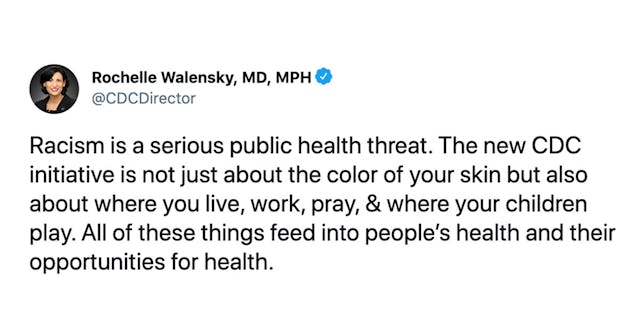The CDC Has Identified Racism As A 'Serious Public Health Threat'

The CDC is putting their words into action on the subject of racism
This week, the Centers for Disease Control and Prevention became the largest health agency to identify racism as a “serious public health threat.”
The agency launched an initiative called Racism and Health, issuing a statement calling racism a “fundamental” cause of “health inequities, health disparities and disease,” that has been further exacerbated by COVID-19. “The pandemic illuminated inequities that have existed for generations and revealed for all of America a known, but often unaddressed, epidemic impacting public health: racism.
Racism is a serious public health threat that directly affects the well-being of millions of Americans. As a result, it affects the health of our entire nation,” the statement continued. “Racism is not just the discrimination against one group…but the structural barriers that impact racial and ethnic groups differently to influence where a person lives, where they work, where their children play, and where they worship and gather in community.”
In an interview with Time magazine, CDC Director Dr. Rochelle Walensky acknowledged the agency has discussed the connection between racism and health inequities in the past but has not before taken action on the issue to address it.
“The word racism is intentional in this [initiative] for the CDC. This is not just about the color of your skin but also about where you live, where you work, where your children play, where you pray, how you get to work, the jobs you have,” Walensky said. “All of these things feed into people’s health and their opportunities for health.”
The CDC outlined several initiatives it would be taking to help combat the spread of racism, including making “new and expanded investments in racial and ethnic minority communities,” providing resources to address “disparities related to COVID-19 and other health conditions,” and
launching a new web portal “Racism and Health.” This will be designated as a hub for public and scientific information on the subject.
Not only has the pandemic brought inequalities to the forefront, the tragic murder of George Floyd last summer led to global protests on racism, causing long-overdue conversations and action to be taken in the workplace, in society, and in people’s living rooms.
“[Racism] negatively impacts and exacerbates health inequities among historically marginalized communities,” Willarda Edwards, an AMA board member, said in November. “Without systemic and structural-level change, health inequities will continue to exist, and the overall health of the nation will suffer.”
“It has to be baked into the cake,” Walensky told Time. “It’s got to be part of what everybody is doing.” It’s an apparent and much-needed step to begin to scratch the surface of the issue of racism in this country.